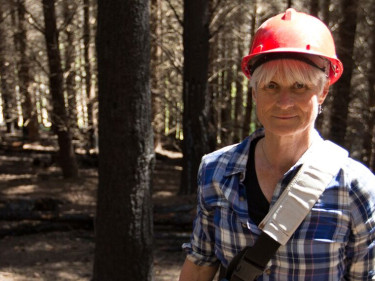Do you own or manage a small forest?
Whether you're responsible for a few trees or over 100 hectares, it's critical you protect your land from fire. Not only so you can realise the full value of the trees or the site, but also so you can prevent loss of property and life.
Reducing your risk
Understanding what can cause fires to start and spread in your forest will help you reduce the risk.
Management options
- Plant your forest with species with a lower burning risk.
- Plant a buffer of less flammable species, such as natives, that is 10 to 20 metres wide.
- Clear trees and scrub near buildings.
Maintain your small forest
- Create firebreaks on ridgelines or property boundaries.
- Prune lower branches and clear the prunings from roadsides.
- Keep weeds down on forest margins.
- Remove or bury all rubbish.
- Clear flammable scrub such as gorse from near or under your trees along tracks or roads.
- Keep tracks and roads clear for access by firefighters.
Operate machinery safely
Used unsafely, machinery can start large fires that spread quickly over many kilometres.
Whether you're using large industrial vehicles like bulldozers, excavators or trucks, or handheld tools like chainsaws, disc grinders and welding equipment, it's important you take steps to reduce the risk of fire.
- Be particularly careful when using machinery during extreme fire danger periods. Make sure to check the fire weather and fire season in advance.
- Keep equipment clean and well maintained.
- Wet down any areas where you'll be working and keep fire equipment on hand.
Check out our guide to using machinery for more information
Avoid possible ignitions
- Keep vegetation clear of power wires.
- Inform contractors of any gas pipelines and contact the pipeline owner.
- Avoid planting on sites where there may be pockets of natural gas.
- Do not use explosives in elevated fire danger periods.
Check recently burned areas regularly in high winds. These can become ignition sources.
Being prepared for fire
If a fire starts, it must be put out as soon as possible, before it spreads. You can help by making some preparations in advance.
Ensure you have:
- Easy and safe site access. A large truck about 4 metres wide and 2.5 tonnes should be able to drive and turn on roads and bridges.
- Good signage. There should be clear signs at entrance points, water supplies, and property boundaries to direct firefighters, including RAPID numbers.
- Adequate and accessible water. There should be streams, rivers, ponds, dams or tanks that firefighters can use in an emergency.
In addition, have a plan to move any stock to safe areas in an emergency.
Have an up-to-date map and/or aerial photo available showing tracks, water points and hazards. This will help responders in an emergency.
Fire Response Schedule
Prepare a Fire Response Schedule and distribute it to your nearest Fire and Emergency local area office, and a helpful neighbour. The schedule will tell them:
- What to do
- Who to contact
- How to access the property
- Where to find water supplies
- Hazards to be aware of
Ensuring neighbours and visitors are fire safe
It's important to have a good relationship with neighbours and visitors to your property. They will call 111 and notify Fire and Emergency New Zealand if they spot a fire on your property.
Discuss fire safety with visitors
If people visit and use your forest for recreation, discuss fire safety with them. Encourage responsible and sensible people to use your forest area.
If you have a contractor working in your forest, ensure their contract specifies conditions for the safety of others, themselves and the forest.
Keep ‘fire starters’ out of your forest
Ensure your property is secure to discourage people from trespassing and using your property for illegal activities like burning out a stolen vehicle or cultivating drugs.
Consider having locked gates, fences or barriers, such as drains, concrete blocks or large trees across potential entry points.
If necessary, use the Trespass Act 1980.
Insurance
Neighbours, recreational visitors and contractors should have insurance in case they are responsible for causing a fire on your property that needs suppressing.
For more information, see our guide to rural fire insurance.
Safetree
Sponsored by the forest industry and government agencies, Safetree™ is part of the Government’s commitment to reducing serious harm and fatalities in New Zealand’s workplaces by 25% by 2020.
Safetree™ provides resources to people at all levels in the industry to remind them how to do their jobs safely. Safetree™ targets information at forest owners and managers, contractors, foremen, head breaker outs, breaker outs, tree fallers, and hauler and machine operators.














